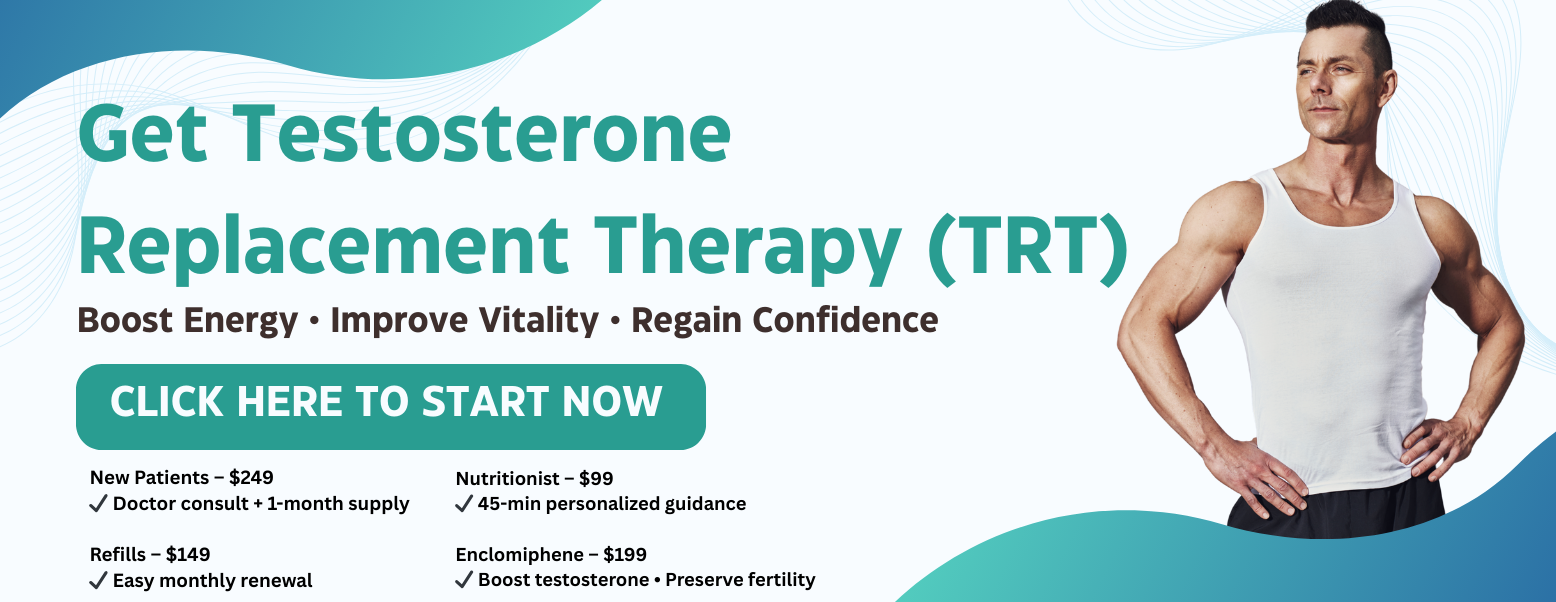Low testosterone can affect many aspects of a man's health. This hormone no longer functions solely in sexual features; it additionally impacts muscle mass, temper regulation, and general strength levels.
It's crucial to pick out associated signs, mainly because approximately 39% of men 45 and older in the United States enjoy this circumstance, and the percentage will increase with age.
Don’t Wait, Reclaim Your Vitality – Click here to Book Your TRT Consultation Now!
Think of it as a battery regularly dropping its charge; as testosterone levels decrease, so can a man's average features and well-being. The proper information is that the remedy is generally relatively straightforward.
Here's what you want to understand about the reasons for low Testosterone, early signs, and treatment options.
About low testosterone (male hypogonadism)?
Low testosterone (male hypogonadism) is a circumstance wherein your testicles don't produce sufficient testosterone (the male sex hormone). More specifically, the Leydig cells in your testicles make testosterone.
Low testosterone causes specific signs at specific ages. Testosterone levels in adults decline with age.
Other names for low testosterone and male hypogonadism include:
- Testosterone deficiency syndrome.
- Testosterone deficiency.
- Primary hypogonadism.
- Secondary hypogonadism.
- Hypergonadotropic hypogonadism.
- Hypogonadotropic hypogonadism.
Role of testosterone in the male body
Testosterone is an intercourse hormone. It involves lots of elements of male health, including:
- Puberty and male sexual development
- Sex power
- Bone strength
- Muscle boom
- Red blood molecular manufacturing
- Energy and temper
Having low testosterone levels can affect these types of functions.
Signs of Low Testosterone in Low Testosterone
After age 30, testosterone levels in Men can decline somewhat, and that is no longer regularly problematic. But if your testosterone levels get too low, it can present several signs and interfere with your daily life, standard wellness, and relationships.
If you are struggling with such signs, you could check your testosterone levels and deal with your symptoms. Here are a number of the unusual signs of low testosterone:
1. Reduced Sex drive
The preference for intercourse ebbs and flows for most men, and low dips are normal and no longer a cause for concern. If your libido is drastically decreased from what it used to be, however, low testosterone levels can be the culprit. This is because the hormone performs a crucial role in your intercourse pressure.
2. Erectile dysfunction
Occasional trouble accomplishing or retaining an erection is likewise normal; however, if it occurs frequently, that is taken into consideration as erectile disorder.
Testosterone stimulates the manufacturing of nitric oxide in penile tissue, which makes erections possible. So the more you decrease your ranges, the less, in all likelihood, you'll be able to get or preserve an erection.
3. Lower energy levels
Among other crucial roles, balanced hormones permit nice strength ranges at some point in the day. If you're missing testosterone, your strength can drop and make you feel worn out even after a fantastic night's sleep. This dip in strength can cause tiredness and fatigue.
4. Increased body fat
A lack of testosterone could cause a boost in fatty tissue mass. Low T is also connected with gynecomastia, which produces more tissue in the breast. Gynecomastia may arise when the body's testosterone and estrogen levels are uneven.
5. Decreased bone mass
Osteoporosis is a condition that influences bone density, and testosterone allows the production and reinforcement of bones.
People with low testosterone, in particular older males, can also have decreased bone mass and be more prone to bone fractures.
6. Mood swings
While an appropriate correlation isn't understood, low testosterone is connected with inflicting and aggravating depression, anxiety, and irritability. Other consequences of low testosterone levels, which include sexual disorders and tiredness, can get worse.
7. Hair loss
Hair loss typically stems from low levels of testosterone. While hair loss may be because of aging, low testosterone levels can also play a part. You may be aware of bald spots you hadn't had earlier or growth in thinning hair in a few regions of your body.
8. Osteoporosis
When your testosterone levels are adequate, some testosterone is converted into estrogen to defend your bones. But if you have low testosterone levels, your frame doesn't do this.
This results in your bones becoming vulnerable and much more likely to break. Low bone mineral density and osteoporosis from low T are at their maximum in men over 65. However, all men have to be aware of this risk.
Hot flashes
Hot flashes are normally related to menopause. However, men can also have them. Hot flashes usually most effectively take place in men who've long passed through chemotherapy and have nearly no testosterone left in their bodies.
While specialists don't recognize why this happens, if you have hot flashes, you must share them with a healthcare professional. They can help you pinpoint whether or not low T is causing them.
Who does low testosterone (male hypogonadism) affect?
Male hypogonadism is a scientific condition that can affect human beings with testicles at any age, from birth through adulthood.
Low testosterone is much more likely to affect human beings who:
- Are older.
- Have obesity.
- Have poorly controlled Type 2 diabetes.
- Have obstructive sleep apnea.
- Have persistent scientific conditions, together with a kidney disorder or cirrhosis of the liver.
- Have HIV/AIDs.
Diagnostic Tests for Low Testosterone
Healthcare companies often use blood assessments to determine testosterone levels, although saliva and urine assessments are also available. Saliva testing has been determined to be doubtlessly much less dependable because of numerous factors, which include series techniques, sensitivity, steroid stability, the presence of binding proteins, and reference range anomalies.
- Blood Test: This is the maximum, not unusual, place approach for assessing testosterone levels and includes measuring overall and free testosterone. It is usually performed in the morning while testosterone levels peak.
- Saliva Test: This check measures the loose testosterone found in saliva and might mirror the bioavailable testosterone inside the body.
- Urine Test: Urine assessments can assist in apprehending testosterone metabolism and are specifically beneficial in particular scientific settings
Top Options to Treat Low Testosterone
Managing low testosterone entails an aggregate of lifestyle changes and clinical remedies tailor-made to a person's wishes and fitness conditions.
Lifestyle Changes
Improving testosterone levels obviously can be completed via lifestyle adjustments. Key techniques include
- Diet: Eating a balanced diet rich in protein, wholesome fats, and carbohydrates can help regulate hormone production.
- Exercise: Regular bodily activity, mainly energy schooling and high-depth c programming language schooling (HIIT), can guide testosterone levels. Exercise additionally facilitates lessening obesity, which is closely connected to decreased testosterone levels.
- Weight Management: Maintaining a healthy weight is critical to healthy stages, as excess fat can convert testosterone into estrogen, reducing testosterone levels.
- Sleep: Quality sleep is essential for testosterone manufacturing. Most testosterone is produced during sleep, so negative sleep styles can considerably affect hormone levels.
- Stress Reduction: Chronic strain increases cortisol levels, which inversely affects testosterone. Practices that include meditation, deep breathing, and different stress-control strategies can help mitigate this effect.
Medical Treatment
When lifestyle modifications are not sufficient to cope with low testosterone, scientific interventions may be considered:
- Testosterone Replacement Therapy (TRT): TRT can be administered in numerous forms, including injections, patches, gels, or subcutaneous pellets, to help normalise testosterone levels. Each method has advantages and considerations, and the choice is predicated upon personal preference, cost, and response to treatment.
- Clomiphene Citrate: This medicinal drug can be applied to some men to stimulate the testes' production of testosterone. It is beneficial for those who want to preserve fertility, as it does not suppress sperm production like some varieties of TRT.
- Human Chorionic Gonadotropin (hCG): This hormone is occasionally used with TRT to preserve the testicular period and function during the treatment.
Each treatment opportunity has functional risks and benefits, and the choice must be made in consultation with a healthcare provider. Treatments, specifically medications, must be closely monitored through laboratory testing.
Secret tips to live with low testosterone
No one likes to live with low testosterone. Still, if you are helpless and no options are left other than living with testosterone. There are still some secrets tips that can do the magic while you live with Low T.
- Stays active: frequently participates in bodily sports, including cardiovascular, power education, and versatile physical games, to help testosterone levels, enhance temper, and maintain muscle power.
- Balanced Meals: Choose nutritious diets rich in fruit, vegetables, complete grains, and lean protein, and focus on meals containing zinc, vitamin D, and omega-three fatty acids to help hormonal fitness and maintain testosterone.
- Stress Management: Implement pressure-relieving strategies, along with yoga, meditation, deep respiration, and physical games, to lessen the effects of pressure on testosterone production.
- Get plenty of sleep: Prioritize 7 to 9 hours of sleep at night to achieve the highest testosterone levels and trendy fitness.
- Limit alcohol and keep away from dangerous substances: mild alcohol intake and avoidance of tobacco and unlawful drugs, stopping bad outcomes on testosterone levels and fitness.
Conclusion
Low testosterone affects your body, energy, mood, motivation, and relationships. If you notice signs like chronic fatigue, reduced libido, muscle loss, or mental mist, it's time to avoid guessing your vitality and regain it.
At TheKif, you are a man with a goal, and we are here to support your journey with professional care, advanced telehealth and TaylorMade testosterone therapy plans.
Here is what you get by counting on KIF for TRT therapy:
- Free consultation $0: A conversation with a licensed TRT expert will address all your concerns without obligation.
- New Patient: TRT Program $249: Start your customized treatment plan with expert instructions and the first treatment month.
- Monthly TRT Subscription: Seamless supply with monthly telehealth consultation and 30 days of TRT supply, with accuracy and convenience.
- Refills - $149: Keep your progress with affordable monthly refills and ongoing professional support.
Don't let your low testosterone history be controlled. Visit thekif.com to book a free consultation and rediscover your physical, mental and emotional self.
 Since 2021, Kif offers a streamlined platform to get a medical marijuana card online. We have served more than 45K patients across the United States. Sign Up Now to get the right to use medical cannabis for your health condition without any delay.
Since 2021, Kif offers a streamlined platform to get a medical marijuana card online. We have served more than 45K patients across the United States. Sign Up Now to get the right to use medical cannabis for your health condition without any delay.
























